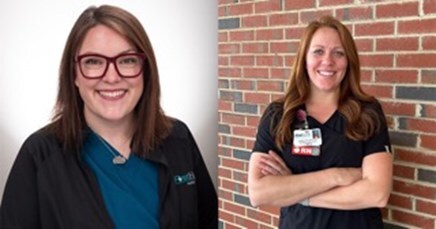
Emily Harder, MSN, R.N., CEN, SANE and Amber Carpenter, BSN, R.N., CEN, SANE
PINEHURST, N.C. - Many states, including North Carolina, are experiencing a shortage of sexual assault nurse examiners (SANE), which can prevent patients from receiving proper care after an assault.
Amber Carpenter, BSN, R.N, CEN, SANE, and Emily Harder, MSN, R.N., CEN, SANE, both nurses at FirstHealth of the Carolinas, recently received SANE qualification as part of the attorney general’s state-wide effort to train more SANEs. FirstHealth now has four SANE-qualified nurses and one SANE-certified nurse, a rarity for most rural health care systems.
“It was extremely eye-opening to learn how underserved most of North Carolina is,” Harder said. “Some hospitals don’t even have one SANE nurse. The fact that we have five at FirstHealth is truly remarkable.”
Sheila Cannon, M.D., the associate dean of Fayetteville State University (FSU) School of Nursing, recorded a total 62 SANEs in North Carolina, with only 7 of 18 counties having a certified nurse.
While all emergency room nurses are trained on how to open sexual assault kits and perform exams, SANEs receive additional training in treating injuries, properly documenting the correct anatomical names and collecting forensic evidence. If the victim files charges, correct documentation and evidence collection can help prosecute the perpetrator in court.
In a fast-paced emergency department environment, SANE training is especially important, Harder said.
“This is a very special population that has been through a traumatic event, oftentimes by people they know. That extra training can make it an easier process on them,” she said. “We’re educated on how to talk with these patients, on what resources we can provide them after care and how to give them that one-on-one attention they deserve.”
To earn SANE qualification in North Carolina, nurses must complete 40 hours of computer-based training and 16 hours of in-person training, which includes pelvic exams on live models. To become SANE certified after training, nurses must practice as a qualified SANE nurse for two years and sit for the board examination.
Last spring, Attorney General Josh Stein launched a program to train 50 North Carolina nurses to serve as SANEs in hospitals. The U.S. Department of Justice provided a $2 million grant to sponsor nurses through training. Both Carpenter and Harder applied for the program and received scholarships for training at FSU.
Harder has also helped form a task force at FirstHealth comprised of SANEs; convenient care medical director Matthew Vreeland, M.D.; emergency medicine doctor Daniel Goodberry, M.D.; and director of nursing excellence Karen Lindell, R.N., DNP, to continue increasing resources to better care for sexual assault victims.